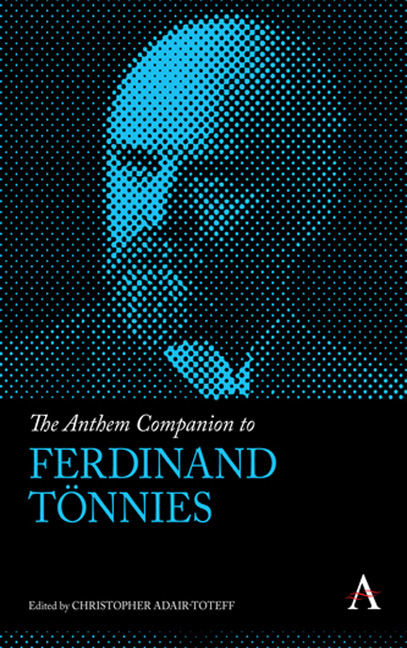Book contents
- Frontmatter
- Contents
- Introduction
- Chapter One Ferdinand Tönnies and the Development of Sociology
- Chapter Two Ferdinand Tönnies and Georg Simmel
- Chapter Three Whither Gemeinschaft: Willing and Acting Together as
- Chapter Four Tönnies and Globalization: Anticipations of Some Central Concerns of Twenty-First Century Sociology
- Chapter Five From Metropolis with Love: Tönnies, Simmel and Urban Social Architecture
- Chapter Six Ferdinand Tönnies: Hobbes Scholar
- Chapter Seven Gender and Family
- Chapter Eight The Power and Value of Public Opinion as a Form of Societal Will
- Chapter Nine The Politics of Ferdinand Tönnies
- Chapter Ten Crime and Law in Gemeinschaft und Gesellschaft
- Contributors
- Index
Chapter Three - Whither Gemeinschaft: Willing and Acting Together as
Published online by Cambridge University Press: 22 July 2017
- Frontmatter
- Contents
- Introduction
- Chapter One Ferdinand Tönnies and the Development of Sociology
- Chapter Two Ferdinand Tönnies and Georg Simmel
- Chapter Three Whither Gemeinschaft: Willing and Acting Together as
- Chapter Four Tönnies and Globalization: Anticipations of Some Central Concerns of Twenty-First Century Sociology
- Chapter Five From Metropolis with Love: Tönnies, Simmel and Urban Social Architecture
- Chapter Six Ferdinand Tönnies: Hobbes Scholar
- Chapter Seven Gender and Family
- Chapter Eight The Power and Value of Public Opinion as a Form of Societal Will
- Chapter Nine The Politics of Ferdinand Tönnies
- Chapter Ten Crime and Law in Gemeinschaft und Gesellschaft
- Contributors
- Index
Summary
Introduction
Tönnies's (1957 [1887]) seminal work Gemeinschaft und Gesellschaft forms an important part of the historical discourse on the interpretation of collective social life. He offers a compelling view of community founded on authentic interhuman relationships set against a background of impending societal change. The mere mention of Gemeinschaft conjures up the quintessential image of a close-knit “rural idyll.” By comparison, Gesellschaft encapsulates mechanistic social relations, accelerated individualism and rational (e.g., economic) self-interest, all of which are associated with the increasing sociocultural dominance of “the city.” His work draws a sharp distinction between everyday social processes embedded in communal relations as contrasted with exchange dynamics. Contemporary academics continue to make reference to Tönnies's signature concepts in reflecting on the meaning and transformation of community. Often, however, such discussions comprise oversimplified representations of his typological constructs and social change theory. Far too little attention is focused on Tönnies's insights into the dimensional complexity of social entities and human volitional tendencies to “act” together. Some of his most substantive contributions concern the relational fabric of human (social) will and joint agency—the fundamental building blocks of collective community action.
This chapter opens with an overview of Tönnies's (1957[1887]) ideal type Gemeinschaft/ Wesenwille –Gesellschaft/Kürwille distinction. This is followed by a discussion of how his social change thesis and theoretical ideas have figured in the ongoing debate over community decline or “loss” (Nisbet 1967[1953]) and the so-called community question (Hennig 2007; Wellman 1979). Just as Tönnies intended, his “conceptual constructions” have proven valuable in describing and understanding the essential nature of varied forms of social relationships (1925a, 77). The second section of this chapter examines aspects of Tönnies's work on organized social life, human volition, social (common) will and collective agency. A key theme is the social-psychological and social constructionist foundations of emergent collective entities (e.g., corporations and communities). Of particular interest here is Tönnies's (1932) claim that concrete entities exist in and through the (social) will of their participants, that is, as active creations of human thinking and willing.
- Type
- Chapter
- Information
- The Anthem Companion to Ferdinand Tönnies , pp. 59 - 78Publisher: Anthem PressPrint publication year: 2016



